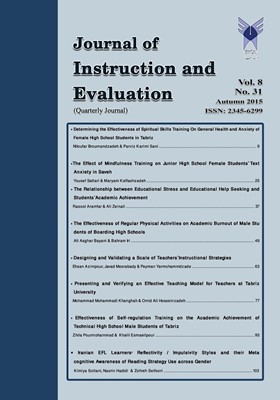Designing and Validating a Scale of Teachers` Instructional Strategies
Subject Areas : Educational PsychologyEhsan Azimpour 1 , Javad Mesrabadi 2 , Peyman Yarmohammadzadeh 3
1 - کارشناسارشد تحقیقات آموزشی دانشگاه شهید مدنی آذربایجان
2 - دانشیار روانشناسی تربیتی دانشگاه شهید مدنی آذربایجان
3 - استادیار مدیریت آموزشی دانشگاه شهید مدنی آذربایجان
Keywords: Exploratory Factor Analysis, validating, Designing, teacher's instructional strategies,
Abstract :
This research was designed to achieve two objectives: a) designing a scale of teachers' instructional strategies and b) Validating the scale. To this end, Delphi method and content analysis were used to design the scale and a within group plan, using descriptive – survey method, was used to validate the scale. This study included two samples: for the first purpose of the study 43 teachers, through convenient sampling, were selected and for the second purpose 354 teachers, through stratified random multistage cluster sampling were chosen. To collect the data, two researcher – made instruments were employed. The first questionnaire included an open-ended question in which the teachers were required to list their instructional strategies in their class. The second questionnaire was a 29 – item scale in which the items were chosen from among the teachers` instructional strategies through content analysis and exploratory factor analysis. The results of the exploratory factor analysis showed that all of the teachers` instructional strategies can be classified in seven categories including strategies of learner – centered (cognitive activation), group – based education, focusing and motivating, providing an optimal environment, direct teaching (teacher – centered), controlling the educational process, and preparation. Teachers can employ various instructional strategies to provide appropriate learning environment for students and directly affect the quality of educational process.
منابع
پاشا شریفی، حسن، و شریفی، نسترن (1380). روشهای تحقیق در علوم رفتاری. تهران: سخن.
سیف، علیاکبر (1391). روانشناسی پرورشی نوین(روانشناسی یادگیری و آموزش). تهران: انتشارات دوران.
سینتیا، لشین؛ جولین، پولاک؛ چارلز.ام، رایگلوث (1374). راهبردهاوفنونطراحیآموزشی. (ترجمه هاشم فردانش). تاریخ انتشار به زبان اصلی وجود ندارد. تهران: انتشارات سمت.
فردانش، هاشم (1384).مبانینظریتکنولوژیآموزشی. تهران: انتشارات سمت.
لاورنس اس، میرز؛ گامست، گلن، و گارینو، ا. جی (1391). پژوهش چندمتغیری کاربردی( طرح و تفسیر). ترجمه حسنپاشا شریفی و همکاران. تهران: انتشارات رشد.
گانیه، رابرت میلز ( 1977). شرایط یادگیری و نظریه آموزشی. ترجمه جعفر نجفی زند(1373). تهران: رشد.
Aljabber, J. M. (2004). Attitudes of Saudi Arabian secondary preservice teachers toward teaching practices in science: The adequacy of preaparation to use teaching strategies in classrooms. (Unpublished doctoral dissertation). Bloomington, IN: Indiana University Graduate School of Education.
Ballantine, J. H. (2001). The Sociology of Education: A Systematic Analysis(5thed.). N.J.: Prentice Hall.
Canady, R. L. & Retting, M. D. (1996). Teaching in the block: Strategies for engaging active learners. Princeton, NJ: Eye on Education.
Henry, B. B. (2003). Frequency of use of constructivist teaching strategies: Effect on academic performance, student social behavior and relationship to class size (Unpublished doctoral dissertation). Orlando, FL: University of Central Florida.
Krejcie, R. V. & Morgan, D. W. (1970). Determining sample size for research activities. Educational and Psychological Measurement, 30, 607-610.
Jonassen, D. H., Grabinger, R. S., & Harris, N. D. C. (1990). Analyzing instructional strategies and tactics. Performance and Instruction Quarterly, 3, 29–45.
Jeck, D. C. (2010). The relationship between levels of teacher efficacy and variability in instructional strategies(Unpublished doctoral dissertation). Alexandria, VA: University of Virginia.
Marzano, R. J. Debra. P., & Jane E. P. (2001). Classroom Instruction ThatWorks: Research-based Strategies for Increasing Student Achievement. Alexandria, VA: Association for Supervision and Curriculum Development.
Merrill, M. D. (2000). Instructional strategies that teach. CBT Solutions, November/December, 1-11.
Moore, K.D. (2000). Classroom teaching skills (5th edition). New York: McGraw Hill.
Oakleaf, M. & Vanscoy, A. (2010). Instructional strategies for digital reference: methods to facilitate student learning. Reference & User Services Quarterly, 49(4), 380-390.
O'Brien, M. (2005). Block Scheduling: A study of teaching strategies found in one public high school in south central Pennsylvania(Unpublished doctoral dissertation). Pennsylvania: Immaculata University.
Ray, J. B. (2005). Examination of web-based teaching strategies at the University of North Texas. Texas: University of North Texas.
Saskatchewan Education Department. (1991). Instructional approaches: A framework for professional practice.Regina, SK: Saskatchewan Education Department.
Weinstein, C. E., & Mayer, R. E. (1986) the teaching of learning strategies. In M. C. wittrock (Eds), Hand book of Research in teaching. Innovation Abstracts, 5 (32), 4. American Educational Reasearch Association.


